
Hazelle
in Memos & Musings · 3 min read
2 weeks ago, we held our regular REITs workshop session to guide investors interested in learning how to select S-REITs for generating additional income.
In light of the current landscape, characterized by high interest rates and a battered REITs market, many participants shared a common concern: “How do we navigate the current REITs market? With high interest rates, does it still make sense to invest in S-REITs now?”
While the workshop primarily focused on sharing the skills to cherry pick S-REITs to invest in and to identify the optimal buying prices, we briefly shared with the class on how we can make sense of the current situation.
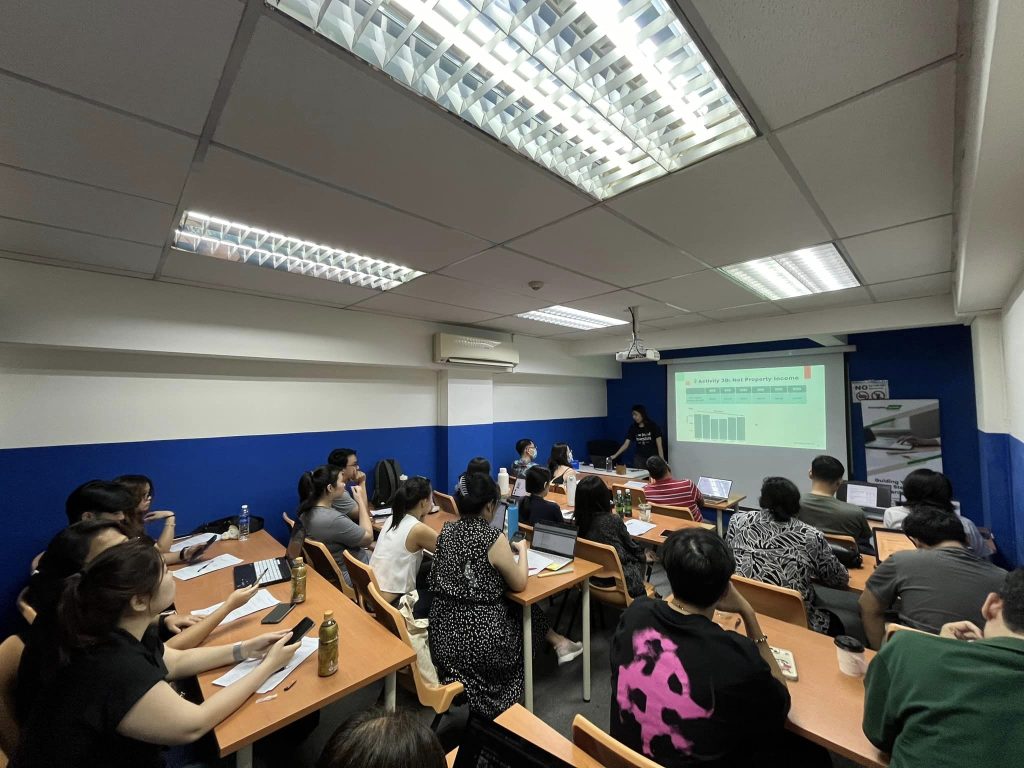

REITs Workshop in May 2024
What is the current situation regarding high interest rates and the S-REITs market?
Since March 2022, the U.S. Federal Reserve started the rate hike cycle in an attempt to curb the high inflation that was driven by factors such as pent-up demand from Covid, supply-chain constraints and higher commodity prices from geopolitical events.
Higher interest rates increase financing costs, thus hurting the corporate profits of businesses. This is especially so for the REITs sector which relies heavily on borrowings to fund for their property acquisitions.
Consequently over the past 2 years, many REITs have been more prudent in their capital management to ensure that their leverage ratios remain within acceptable limits, and have been less active in pursuing new acquisitions.
Additionally, higher interest rates may also result in lower valuations for their properties.
Therefore, investors become more risk averse and switch to fixed income instruments that are paying a higher yield under the high interest environment, resulting in a sell-off in the S-REITs market in the last 2 years.
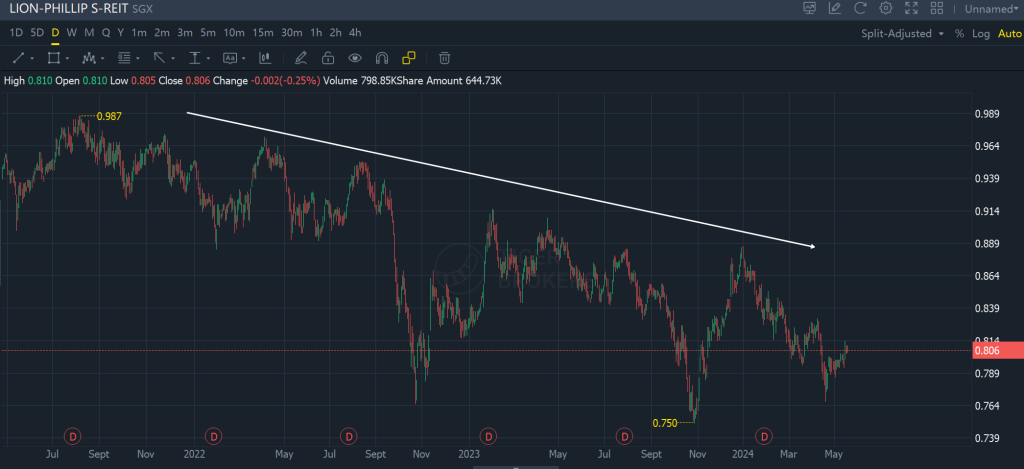

Lion-Phillip S-REIT ETF (Source: Tiger Brokers)
This comes as a shock for many income investors, who have long believed that S-REITs are very safe and stable investments and did not anticipate downward fluctuations exceeding 20%.
Understand that the market moves in a cycle
The key question, in any crisis, is to ask ourselves, “Will this last forever or is it likely to be a temporary event?” In our view, we believe that the current high inflation and high interest rate environment is part of a typical cycle that the market goes through.
Economic changes, business profits, government interventions, and other factors influence market cycles. Once inflation stabilises, the Fed would shift towards rate cuts to normalise the rates. This would make rate-sensitive sectors such as REITs look attractive to investors again and boost the demand for REIT investments.
Over the decades, investors have navigated through economic expansions and recessions, experiencing both rising and falling interest rates environments. As economic conditions evolve and business profits fluctuate over time, central banks intervene accordingly to manage interest rate levels appropriately.
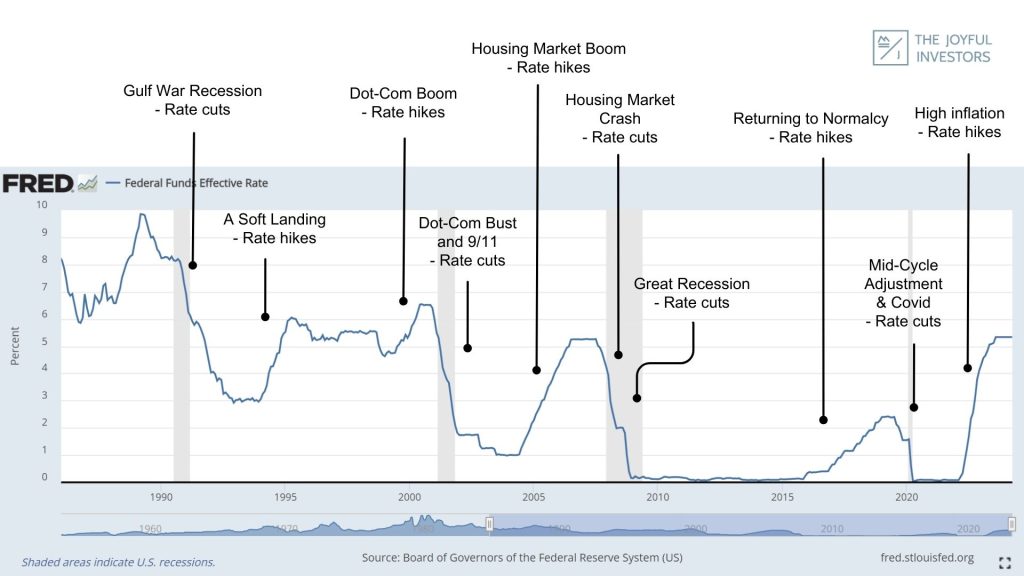

Changes in interest rates from 1990s – 2024
Since last year, the U.S. Fed has also suggested possible rate cuts this year. While the market expectations for rate cuts have declined from 3 rate cuts to 2 this year, it also shows that we are possibly at the peak of the interest rate cycle. Markets are now pricing in for a 52.1% possibility of a rate cut to come in September based on the CME FedWatch Tool.
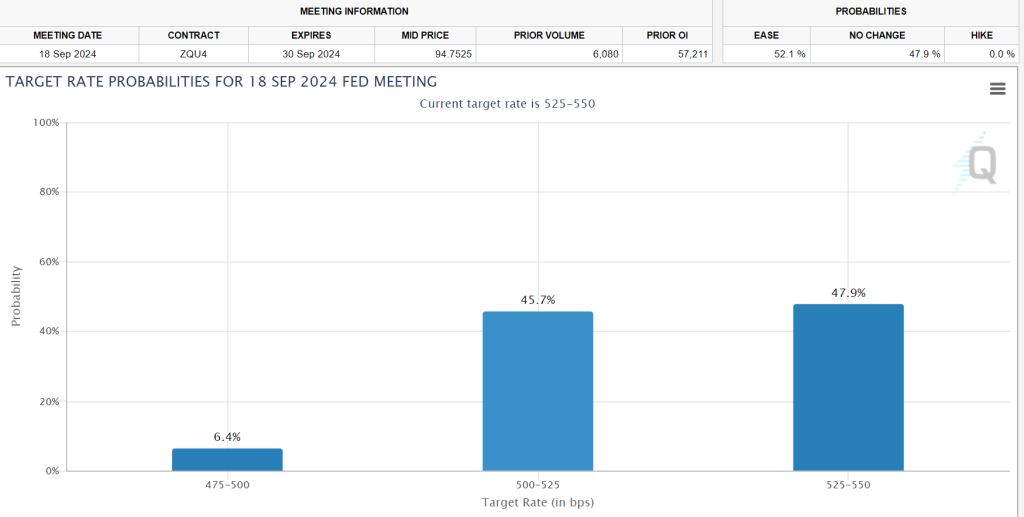

Source: CME FedWatch Tool
Fundamentally, many S-REITs are still performing well
Despite the challenging environment, many S-REITs maintain resilient financial metrics. Although the average interest coverage ratio and aggregate leverage ratio have weakened since FY2022, the more robust S-REITs have their ratios stayed within the regulatory limits. According to data by SGX, the S-REIT sector has an average gearing ratio of 38%.
If we drill down to assess the financial profitability and performance of individual REITs, we would be able to observe that the more resilient REITs have generally been able to deliver stable earnings in the last 2 years.
Operational metrics also remained robust with most real estate subsectors delivering rental reversionary trends. Occupancy rates also remained stable for the resilient REITs.
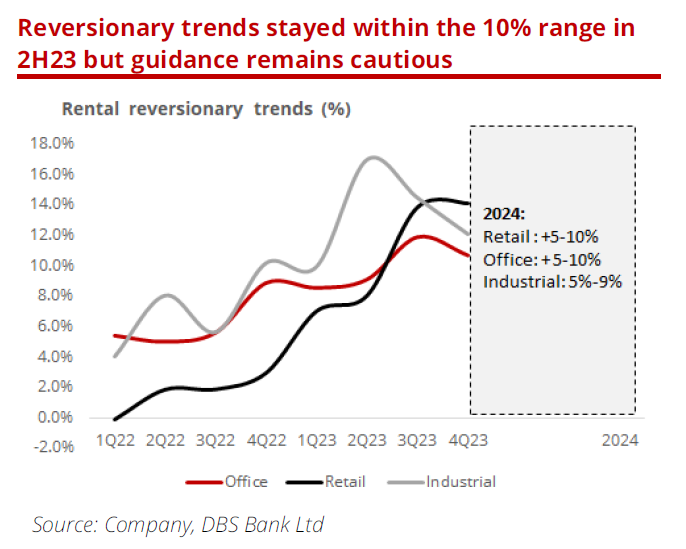

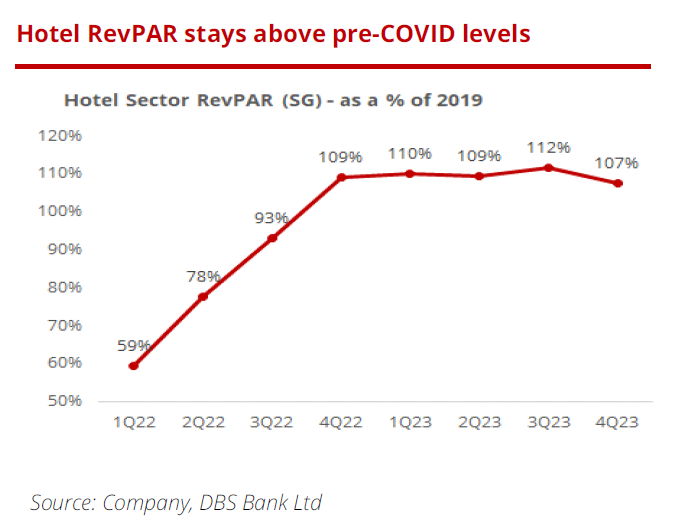

In the short term, the stock market pricing is usually driven by the market sentiments. But over the longer term, it should move more in tandem with the fundamentals of the businesses.
Should we wait for interest rates to fall and the REITs market to recover to previous highs before we start investing in it?
The short answer is no. Conventionally, many investors like to wait till the coast is clear before they start investing. They tend to focus on the risk of losing money in challenging and uncertain environments.
However, if we truly grasp the concept of risk management, we will realise that the best time to accumulate assets in a prudent manner is when all the risks are already evident and priced into the financial markets. Oftentimes, we might be nearer to the bottom of the cycle than the top, with risk-to-reward tilting in favour for us.
Such “crisis” presents opportunities for investors to acquire quality assets at discounted prices. While we certainly can’t predict how long it takes for the recovery of the market, the ability to exercise discipline and patience to act on market opportunities will pave the way towards long-term financial success.
Investing is about preparing for the financial future and strategically position our portfolios for it. It’s less about predicting the exact timing of rate cuts and more about whether your portfolio is well-positioned to benefit financially when they do occur.
Additionally, it’s important to consider whether the downside risks are likely to be contained if the rate cuts are delayed for any reason. These are the key questions investors should be contemplating.
If you would like to capitalize on the undervalued S-REITs market and learn how you can build up your own REITs portfolio, join us in the upcoming session of Invest To Build Passive Income With Singapore REITs workshop.
In this workshop, we will guide you on applying a framework to cherry pick S-REITs to invest in and share how you can buy your selected S-REITs at reasonable prices. The workshop includes hands-on activities to help you immediately put your learning into practice. You may find out more details on the workshop and save your seat here.



About Hazelle
Chief trainer of The Moneyball Investors Playbook program and founder of The Joyful Investors, a financial education firm that seeks to help avid investors learn to invest better and make the journey a joyful one. I graduated with a first class honors in Bachelor of Accountancy from Nanyang Technological University (NTU) and started my auditing career in one of the Big Four. I believe that once we know how to build our wealth sustainably, we can then live our best lives ever.
Important Information
This document is for information only and does not constitute an offer or solicitation nor be construed as a recommendation to buy or sell any of the investments mentioned. Neither The Joyful Investors Pte. Ltd. (“The Joyful Investors”) nor any of its officers or employees accepts any liability whatsoever for any loss arising from any use of this publication or its contents. The views expressed are solely the opinions of the author as of the date of this document and are subject to change based on market and other conditions.
The information provided regarding any individual securities is not intended to be used to form any basis upon which an investment decision is to be made. The information contained in this document, including any data, projections and underlying assumptions are based upon certain assumptions and analysis of information available as at the date of this document and reflects prevailing conditions, all of which are accordingly subject to change at any time without notice and The Joyful Investors is under no obligation to notify you of any of these changes.
· · ·
Have you enjoyed this article? We’d be grateful if you would share this useful content to your friends who may benefit from it as well.




Pingback: REIT Posts of the Week @ 8 June 2024